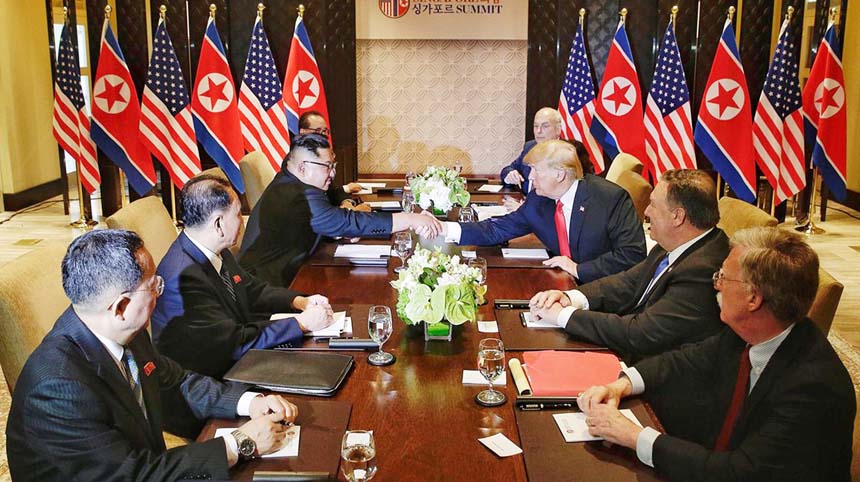
AP, Singapore :
President Donald Trump on Tuesday rocked a region and suggested the upending of decades of U.S. defense posture on the Korean Peninsula when he announced that he was stopping annual U.S.-South Korean military drills and wants to remove the 28,500 U.S. troops stationed in the South as a deterrent against North Korean attack. The stunning, almost offhand comments, made during a news conference hours after his summit with North Korean leader Kim Jong Un, contradicted countless previous declarations by U.S. political and military officials over the years that the drills are routine, defensive and absolutely crucial.
Trump has now essentially adopted the standard North Korean line, calling the military exercises a “provocative” drain of money and announcing they would stop while he continues talks with Kim, whom he repeatedly praised as a solid negotiating partner.
His statement was quickly portrayed by critics as a major, unreciprocated concession to a country that only last year was threatening Seoul and Washington with nuclear war.
It also seemed to leave officials completely off guard in South Korea, where the presence of U.S. troops has long been described as necessary to maintaining peace on the peninsula.
President Donald Trump has stunned the Korean Peninsula by announcing the stoppage of U.S.-South Korean annual war games that have long been defended as defensive and vital by the allies. (June 12)
Seoul’s presidential office told The Associated Press that it was trying to parse Trump’s comments. The South Korean military seemed similarly surprised.
“At this current point, there is a need to discern the exact meaning and intent of President Trump’s comments,” Seoul’s Defense Ministry said, adding that there have been no discussions yet with Washington on modifying drills set for August. U.S. forces in South Korea said it has “received no updated guidance on the execution or cessation of training exercises” and will continue to coordinate with South Korean partners and maintain the current posture until it receives an updated guidance from the Department of Defense or the Indo-Pacific Command.
Trump’s comments will be questioned by many in South Korea and beyond, with some seeing in them an effort by North Korea to drive a wedge between Seoul and Washington.
North Korea regularly calls the military exercises provocative preparations for a northward invasion, and many of the scariest standoffs in recent years on the Korean Peninsula have happened when the drills were being staged. Outside analysts believe the North objects to the drills because it must spend precious resources on its own war games and troop movements. North Korea also insists that the U.S. troop presence in the South, as well as its nuclear “umbrella” over allies Seoul and Tokyo, are part of America’s “hostile” policy toward the North. “I want to bring our soldiers back home,” Trump said, although he added that it’s “not part of the equation right now.” Then he said: “We will be stopping the war games, which will save us a tremendous amount of money unless and until we see the future negotiation is not going along like it should. But we’ll be saving a tremendous amount of money. Plus, I think it’s very provocative.”
The comments could fundamentally change the way the United States, whose alliance with Seoul was forged after a 1950 surprise attack by the North started the Korean War, operates in South Korea.
Trump’s announcement that the U.S. would stop military exercises, his description of those drills as “provocative” and his suggestion that he wants to pull U.S. troops out at some point are “all things that Trump is putting on the table as concessions, all in exchange for some vague promises by the North Koreans,” said Paul Haenle, a former China director at the White House National Security Council in the Barack Obama and George W. Bush administrations.

